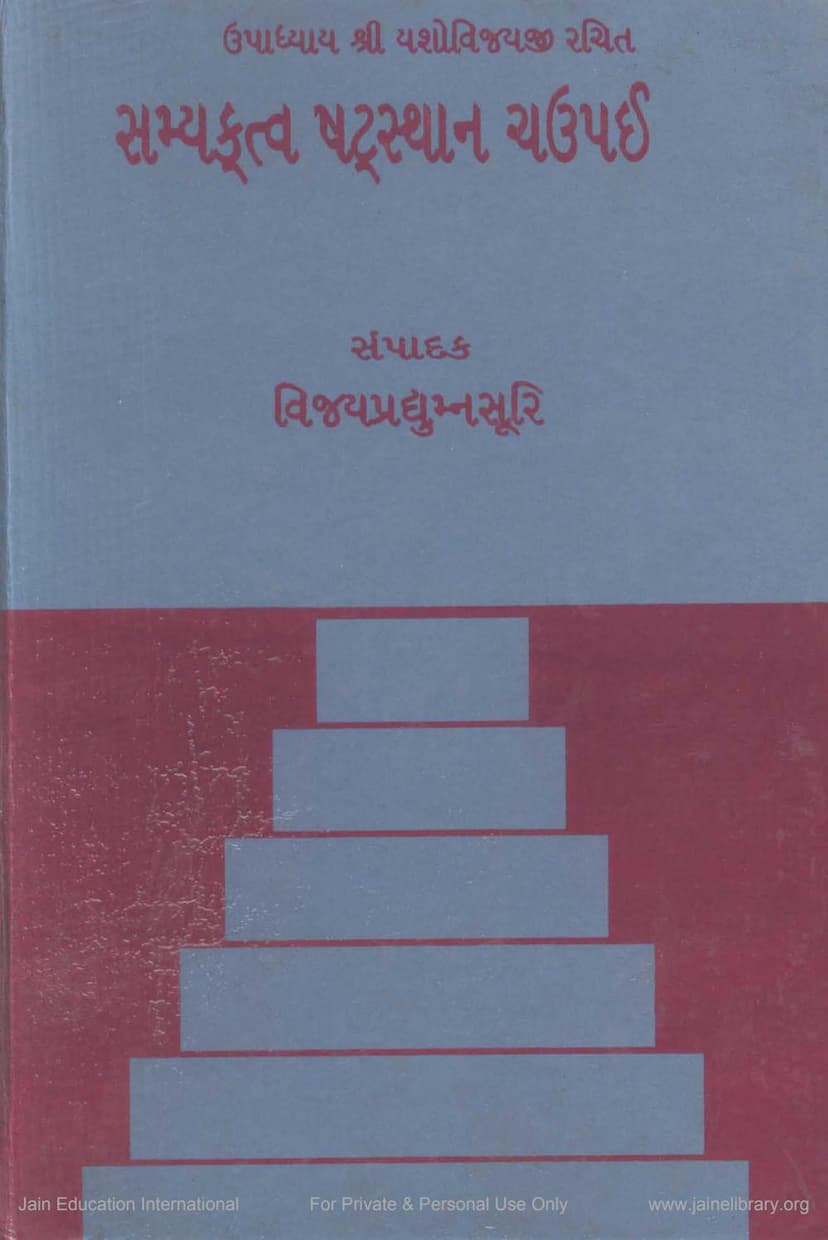Samyaktva Shatsthana Chaupai
Added to library: September 2, 2025

Summary
Summary of Samyaktva Shatsthana Chaupai
This document is a Gujarati text titled "Samyaktva Shatsthana Chaupai" (સમ્યક્ત્વ ષટ્રસ્થાન ચઉપઈ), authored by Upadhyaya Yashovijayaji and edited by Acharya Pradyumnasuri. It is published by Shri Shrutgyan Prasarak Sabha, Ahmedabad. The text is a commentary on the six fundamental principles of Samyaktva (Right Faith) in Jainism.
The book, in its second revised edition from 1998, aims to present the teachings of Upadhyaya Yashovijayaji in a clear and accessible manner. The editor, Acharya Pradyumnasuri, highlights the importance of this text as a valuable resource for those devoted to truth and Jain philosophy. The editorial notes explain the process of revision, referencing various manuscripts and scholars who contributed to the improved edition.
Core Content and Structure:
The "Samyaktva Shatsthana Chaupai" expounds upon the six fundamental truths or principles that constitute Samyaktva, as understood within the Jain tradition. These six points are systematically presented and explained:
- Existence of the Soul (Jivasti): The text affirms the existence of the soul as a distinct entity.
- Eternality of the Soul (Nityatva): It asserts that the soul is eternal and does not perish.
- Soul as the Doer (Karta): The soul is presented as the agent of its actions.
- Soul as the Enjoyer (Bhokta): The soul is described as the one who experiences the fruits of its actions (karma).
- Existence of Liberation (Nirvana): The text confirms that liberation from the cycle of birth and death is possible.
- Existence of the Path to Liberation (Upaya): It emphasizes that there is a path or means to achieve liberation.
Refutation of False Views (Mithyatva):
Following the exposition of the six truths of Samyaktva, the text then systematically refutes the corresponding six false views (Mithyatva) that deviate from right faith. These are presented as the antithesis of the true principles:
- Nastikavada (Charvaka) - Denial of Soul/Existence: The text refutes the Carvaka philosophy, which denies the existence of the soul separate from the body, and attributes consciousness to the mere combination of material elements.
- Anityavada (Buddhism) - Impermanence of the Soul: It addresses the Buddhist concept of impermanence, arguing against the idea that the soul is merely a stream of fleeting moments (kshanikas).
- Akarta-Abhoktavada (Vedanta/Samkhya) - Soul as Non-Doer/Non-Enjoyer: The text critiques the Vedanta and Samkhya philosophies that view the soul as a passive observer, detached from actions and their consequences. It refutes the idea that the soul is merely a reflection or a non-involved witness.
- Niyativada/Anupaya-vada - Fatalism/Absence of Means: It counters the philosophies of fatalism and the denial of any effective means or path to liberation.
- Moksha-abhavavada - Denial of Liberation: The text addresses views that deny the possibility of liberation from the cycle of existence.
- Anirvanavada - Indeterminism: It discusses the idea of indeterminism and its implications for the path to liberation.
Methodology and Style:
Upadhyaya Yashovijayaji, known for his profound scholarship and clear exposition, employs a logical and dialectical approach. The "Chaupai" (a poetic form in Hindi/Gujarati) format is used for the verses, making the philosophical concepts more engaging and memorable. The "Balavabodha" (સ્વોપજ્ઞ બાલાવબોધ) is the author's own commentary in simple Gujarati, explaining the intricate philosophical points in detail. The text also draws upon various Jain Agamas and philosophical works from other Indian traditions to support its arguments and refutations.
Key Themes and Arguments:
- The Nature of Reality: The text delves into the ontological status of the soul, karma, and liberation, differentiating between ultimate reality (Paramartha) and conventional reality (Vyavahara).
- The Role of Knowledge and Conduct: It emphasizes the interconnectedness of Right Faith (Samyaktva), Right Knowledge (Samyak Jnana), and Right Conduct (Samyak Charitra) as the path to liberation.
- Critique of Other Philosophical Systems: A significant portion of the text is dedicated to refuting the views of non-Jain philosophies that contradict the core Jain tenets, highlighting the logical inconsistencies and philosophical shortcomings of these opposing views.
- The Importance of Svadavada: The text implicitly and explicitly promotes Svadavada (Syadvada), the doctrine of conditioned predication, as the means to understand the multifaceted nature of reality and reconcile seemingly contradictory aspects.
- The Author's Authority and Tradition: The text is presented as the authoritative work of Upadhyaya Yashovijayaji, a renowned Jain scholar, and its commentary is based on the scriptural tradition.
In essence, "Samyaktva Shatsthana Chaupai" serves as a foundational text for understanding the Jain perspective on right faith, providing a comprehensive and well-reasoned exposition of its principles and refuting alternative viewpoints through logical arguments and scriptural references.